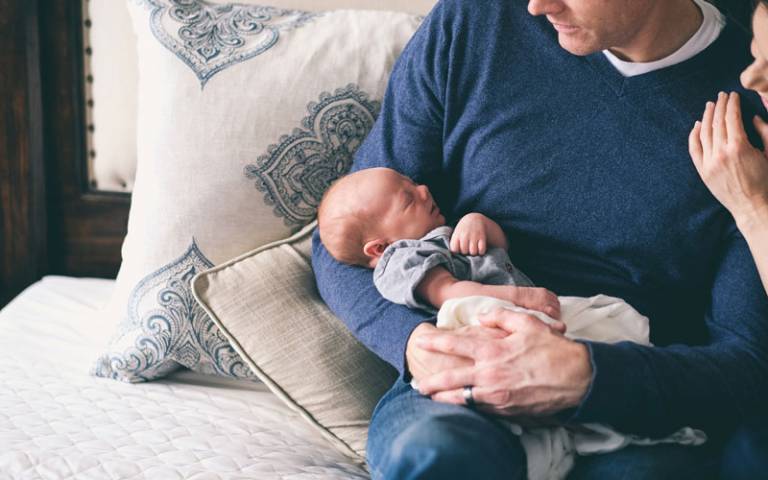Centre for Longitudinal Studies to pilot plans for new national birth cohort study
13 May 2021
The Centre for Longitudinal Studies (CLS) at UCL Institute of Education (IOE) is to launch a new UK-wide study that will test approaches to setting up a full large-scale national birth cohort study in the future.

The study team is calling for input from future data users as it develops its plans for the two-year feasibility study.
The Early Life Cohort Feasibility Study will follow a representative sample of babies born in the UK in 2021 during their first year of life. As well as testing methodologies for a much larger ongoing study, similar to those CLS already houses, the feasibility study will generate valuable research data in its own right.
Funded by the Economic and Social Research Council, part of UK Research and Innovation, the new study will help researchers understand the challenges facing a new generation of babies, born at a time of great uncertainty, in the aftermath of the COVID-19 pandemic and Brexit. In particular, the study will provide new insights on childhood inequalities and the social and biological factors driving these.
The study will capture information about babies’ economic and social environments, and their health, wellbeing and development. It will test the ability to draw a sample of new babies from a national sampling frame and will embed a range of innovative approaches to data collection, including capturing novel measures of neuro-cognitive function, and parent-child interaction. The study team also aim to collect biological samples from parents and infants, and to link administrative records and geo-environmental data to the survey data collected.
The project will work in partnership with the National Children’s Bureau and the First 1001 Days Movement, in order to undertake extensive public engagement, including with participant groups, and policy and practice communities.
The study will be led by Professor Alissa Goodman, Professor Lisa Calderwood (both CLS) and Professor Pasco Fearon (UCL Psychology and Language Sciences), and will also draw on the expertise of a wider team of researchers from across the four nations of the UK.
The research team will also work to maximise participation of traditionally ‘less often heard’ groups. In England, there will be sample boosts for babies born into disadvantaged and ethnic minority families, and further boosts of births in Scotland, Wales and Northern Ireland.
Study will provide "vital information" at a critical time
Professor Alissa Goodman, said: “This feasibility study will provide vital information about babies being born across the UK, at a critical time for our society and economy, providing new evidence on the factors that affect development in the first year of life.
“The data we collect will not only give us detailed insight into the lives of a new generation but, we hope, will pave the way for a full new birth cohort study in time.
“Our scientific consultation, underway now, will be crucial to how we develop the study and to ensuring it meets its aims. We hope data users from across the academic, government and third-sectors will get involved in shaping this important new study.”
ESRC Interim Executive Chair, Professor Alison Park, said: “The last group of children to be included in a UK-wide birth cohort study are the participants in the Millennium Cohort Study born in 2000-2. This is now a generation ago.
“This creates a pressing need for data collection on the next generation: those born in the 2020s. Indeed, new research agendas and political and social issues – such as climate change, mental health issues, air quality, and the effects of the pandemic – heighten this need.
“The Early Life Cohort Feasibility Study announced today will be a relatively small-scale study, both in duration and cost. But it will be a critically important step to establishing the design of a full early life cohort study.”
The project team
The project team comprises experts from the following organisations:
- UCL Centre for Longitudinal Studies (project lead)
- Bryson Purdon Social Research
- Fatherhood Institute
- Manchester Metropolitan University
- Public Health Scotland
- Queen’s University Belfast
- ScotCen
- UCL Great Ormond Street Institute of Child Health
- UCL Psychology and Language Sciences
- Ulster University
- University of Edinburgh
- University of Swansea
In addition, the following project partners will support the study on specific engagement and consultation activities:
- First 1001 Days Movement
- National Children’s Bureau
- Nuffield Family Justice Observatory
The Early Life Cohort Feasibility Study is part of UCL’s growing portfolio of national cohort studies. Earlier this month, plans were announced for the Children of the 2020s Study, a new five-year longitudinal study running from age nine months to five years. Funded by the Department for Education and led by UCL in partnership with Ipsos MORI, it will survey babies born in England only and will have a particular focus on scientific and policy questions relating to the family, early education and childcare determinants of early school success.
Links
- Early Life Cohort Feasibility Study
- UCL Centre for Longitudinal Studies website
- UCL Social Research Institute
Image
Image by StockSnap from Pixabay
 Close
Close

